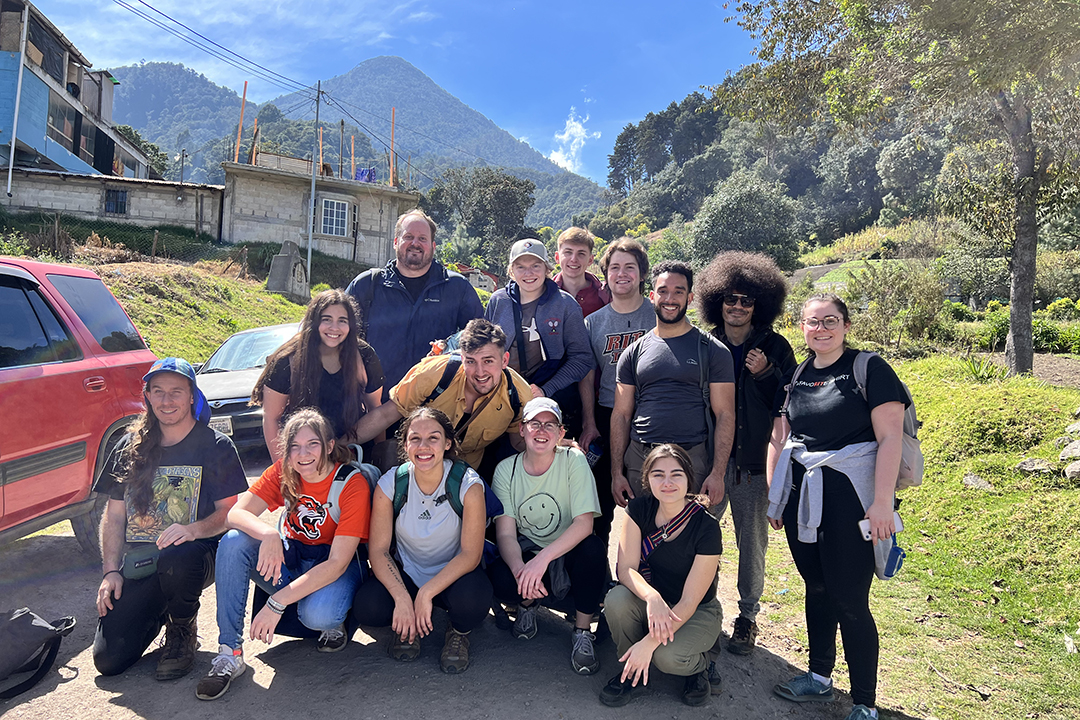Engineering students make an impact in Guatemala’s healthcare system
Students traveled to Guatemala to repair healthcare equipment in hospitals
RIT students and their mentors pose together in Guatemala, where they traveled in partnership with Engineering World Health to repair medical equipment in hospitals.
When RIT students Julia LaMarra and Celina Alvarado heard about a trip to work on repairing hospital equipment in Guatemala during this past winter break, they jumped at the chance. “I wanted to be able to use what I’ve known from my education and incorporate that into real world experience, especially abroad,” Alvarado said. “I was hoping to fix as many machines as possible and get an opportunity to help out.”
The program is facilitated by a partnership with Engineering World Health (EWH). Iris Asllani, a research associate professor in RIT’s Department of Biomedical Engineering, coordinates this partnership and the classes, trips, and club associated with it. “EWH’s mission of pairing the education of young engineers with the improvement of healthcare around the world aligns perfectly with RIT’s vision of training global engineers. The EWH Winter Institute is a tremendous opportunity for students as it provides an experience that would be all but impossible to simulate on campus.”
Asllani added that “the program, which has been going strong since 2014, reflects a coordinated effort and strong support from the biomedical engineering department, Study Abroad Office — shoutout to Cecelia Hencke who works closely with students and respective offices to ensure a smooth and thorough application process — EWH, and on-the-ground staff.”
The program’s site explains that many hospitals in Guatemala, and in other communities worldwide with struggling healthcare systems, depend on donated medical equipment, such as infant incubators, oxygen concentrators, and hospital beds. But this life-saving equipment often falls into disrepair quickly, and finding technicians to repair this equipment can be difficult.
Students like Alvarado, a fifth-year double major in mechanical engineering technology and ASL-English interpretation, and LaMarra, a fourth-year student in the mechanical engineering accelerated BS/ME program, can use their skills to help maintain this equipment and to improve conditions for hospital staff and patients. The students further honed their skills and had a chance to bond together in a preparatory class during the fall 2022 semester before the trip. After finishing the class, the students set out to Guatemala.
When the students split up into groups to work at different hospitals, they each had a different experience, but they all shared the same goal: the students found broken equipment and repaired as much of it as they could. For this year’s trip to Guatemala, EWH reported that the students performed an estimated $144,000 worth of service and repairs. A total of 72 pieces of equipment were returned to service across four different partner hospitals in Guatemala.
Alvarado, who is from Rochester, N.Y., and her groupmate, first-year biomedical engineering BS/MS student Isabella Sanchez from Cali, Colombia, went above and beyond with a secondary project at their hospital placement. Pediatric nurses in their hospital were stuck using two uneven desks pushed together as an infant changing table, which was uncomfortable for them and for the babies. So, Alvarado and Sanchez volunteered to construct a new changing table. They purchased materials, cut, sanded, and painted the wooden frame, and installed a waterproof mattress on top.
Throughout their time in Guatemala, the students took a variety of excursions to make memories together and immerse themselves in the local culture. In the first week of the trip before their placements at hospitals across the country began, the students traveled together to sites like Parque Central and the Santiaguito volcano, and they also took three days of intensive Spanish lessons.
As the students split off to their placements, each group stayed with a local host family. LaMarra, who is from Coram, N.Y., remembers her homestay fondly. “When we got there, the host family invited us out to the family barbeque since it was New Year’s Day, and that was the very first thing we did. We played soccer and some board games with all of the little cousins. We ate some amazing food. It was a good experience, a great way to get into the homestay.”
For LaMarra, her observations from working in Guatemala will impact her decisions as an engineer. “One of the most common fixes that I came across was worn out mechanical buttons, and that’s an easy engineering fix before that product goes onto the market. You don’t know how long these medical devices are going to be used and who’s going to get them after your primary customer, so that’s something I’m going to take into my engineering future.”
Plus, the trip became a pivotal moment in her college journey. “I wanted this trip to be an opportunity for me to reinvigorate myself and really develop my love for engineering and try to find my path, and I think it did a good job of that.”
Alvarado echoed LaMarra’s appreciation of the trip. “I’ve traveled abroad and volunteered abroad before and it gives my heart joy, and it makes me happy and really puts things into perspective for me. And so it’s just a good reminder to immerse yourself in different cultures. It really changes how you think about things and your attitude.”






